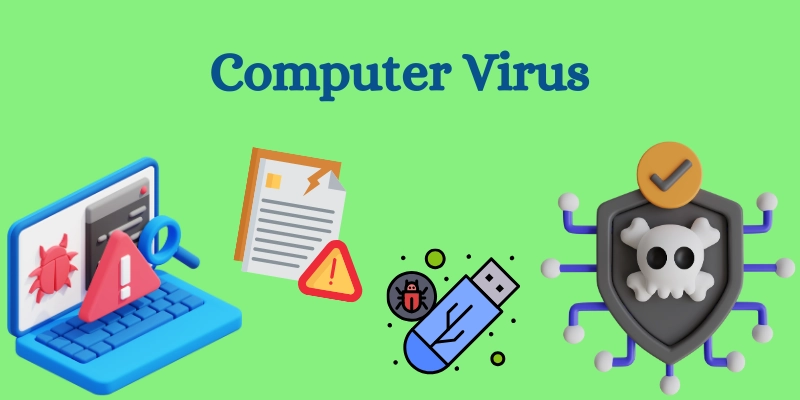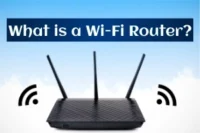What is a Computer Virus Definition Types and Prevention
Published: 3 Sep 2025
Have you ever opened your computer and noticed it acting strangely, like running slowly, freezing, or showing messages you didn’t expect? Many people face these problems but don’t know why they happen.
One of the biggest reasons can be something harmful inside the system. That’s why it’s important to understand what might be going wrong. In this article, we’ll talk about something that can quietly harm your computer and why you should know about it.
In this article, we’ll learn about the fear of computer viruses.
What is a Computer Virus?
A computer virus is like a tiny bug that can sneak into your computer and cause trouble. It can make your computer slow, delete your important material, or even steal your private information.

Viruses usually get in when you open strange emails, click on unsafe links, or download bad files.
- Spread: It can spread from one computer to another.
- Damage: It can damage or delete your files.
- Slowdown: It can make your computer very slow.
- Theft: It can steal your personal information.
- Hidden: Sometimes you don’t even know it’s there.
Real-Life Comparison
Imagine your body catches a cold virus, you feel weak, get a fever, and can’t work properly. A computer virus works the same way. When your computer gets a virus, it also stops working properly. It becomes slow, shows errors, or even crashes.
How a Computer Virus Works?
Just like a real virus that enters your body and makes you sick, a computer virus also enters your computer, spreads, and causes problems.
Let’s see how it works in three simple steps.
How Does It Enter Your Computer?
A computer virus can secretly enter your computer when you:
- Download a file from an unsafe website
- Open an email with a fake or dangerous attachment
- Plug in an infected USB or hard drive
- Install software from untrusted sources
- Click on pop-up ads or fake links
Example: Imagine clicking on a free game download from an unknown website. It may look fun, but it could secretly carry a virus that enters your computer.
How Does It Spread?
Once the virus is inside your computer, it tries to spread to other systems. It can do this by.
- Attaching itself to other files or programs
- Spreading through your email to your contacts
- Moving into USB drives and infecting other devices
- Hiding inside documents you share with others
Example: If your computer is infected and you send someone a document, the virus may go with it and infect their computer too.
What Can It Do to Your Computer?
A virus can do many harmful things.
- Delete important files.
- Steal your private data like passwords or photos.
- Slow down your computer speed.
- Crash your whole system.
- Take control of your computer without you knowing.
Example: You might notice that your computer is acting weird, becoming very slow, or showing strange messages. That could be a virus at work.
How Is a Computer Virus Created?
Many people wonder, “Who makes computer viruses, and why?” Let’s understand this in a very simple way. Some are created by cybercriminals to steal money or personal information. Others are made by hackers who just want to show off their skills or cause disruption.
Who Creates a Computer Virus and Why?
Computer viruses are usually created by hackers or programmers who know how to write code. But not all of them do it for fun; some do it for bad reasons, like:
- Stealing personal information (like passwords, bank details).
- Damaging companies or government systems.
- Earning money through scams or fake ads.
- Taking control of your computer and using it for illegal work.
- Showing off skills in the hacking world.
Example: Just like a thief breaks into a house to steal things, some hackers create viruses to secretly enter computers and take valuable data.
How a Virus Is Made?
Creating a virus needs coding knowledge. Here’s how it works in easy steps.
- The hacker writes a program using a coding language (like Python, C++, etc.)
- They add harmful actions inside the program — like “delete files” or “copy passwords.”
- They hide it inside something useful, like a free app, game, or email file.
- When someone runs or opens it, the virus secretly starts working.
- It spreads and causes damage, often without the user knowing.
Example: Imagine wrapping a dangerous item inside a gift box. When someone opens the box, the damage begins. A computer virus works in the same hidden way.
What Can a Computer Virus Do?
A computer virus can quietly harm your system in many ways. Here are four main things it can do.
- Slow System
- Personal Data
- Damage Files
- Controlling
Let’s look at them in detail.
Slow System
A virus runs secretly in the background and uses your computer’s memory. This makes everything slow. Programs take time to open, typing gets delayed, and your screen may freeze again and again.
Example: Just like carrying too many bags slows you down, a virus slows down your computer by overloading it.
Personal Data
Some viruses are made to spy on you. They can copy your passwords, save your credit card details, and read your private messages or photos. This stolen data is often sent to hackers.
Example: It’s like someone reading your diary without permission—viruses can secretly read your personal information.
Damage Files
Viruses can delete your important documents, break your saved files, or make them impossible to open. You may lose photos, school work, or office files without warning.
Example: Imagine someone tearing your homework pages and throwing them away—that’s what a virus does to your files.
Controlling
Some viruses are powerful. They can lock your screen, block your access, or even shut down your system. In some cases, your whole computer may stop working.
Example: It’s like someone taking the key to your room; you can’t open it anymore. A virus can do the same to your computer.
What Is the Best Computer Virus Protection?
You can protect your computer from viruses by being smart and careful. Here are the three best ways to stay safe.
- Antivirus Software
- Internet Habits
- Updates and Backups
Let’s look at them in detail.
Antivirus Software
Antivirus software helps you find and remove viruses before they can cause harm. It keeps scanning your computer in the background and warns you if anything is unsafe.
Example: Just like a security guard checks who is entering your house, an antivirus checks every file before it enters your computer.
Internet Habits
You should avoid clicking on unknown links, downloading free files from untrusted websites, or opening emails from strangers. Always visit safe websites and avoid pop-up ads.
Example: Just like you don’t talk to strangers on the street, don’t open random links or files online; they could carry viruses.
Updates and Backups
Keep your software and antivirus updated. Updates fix holes that viruses use to enter. Also, save a backup of your important files, so if a virus deletes them, you can restore them.
Example: Like checking your door locks and keeping copies of your keys, updates, and backups, keep your digital world safe.
Conclusion
In this article, we’ve learned about an Overview of computer viruses. A computer virus is like a hidden enemy that can quietly harm your system. It can slow down your computer, steal your data, and even delete your files. But the good news is, you can protect yourself!
Just remember to use good antivirus software, stay careful while using the internet, and always keep your system updated. A few smart steps can keep your computer safe and healthy.
Stay alert, stay safe, and let your computer stay happy too!
I hope you found this article useful. Feel free to share your thoughts in the comment section below!
FAQs
Here are some common questions people ask about computer viruses.
Viruses usually come through email attachments or downloads. They can also enter through fake websites or infected USB drives. Clicking on unknown links is another common way. So always be careful with what you open or install.
Your computer may suddenly become very slow. You might see strange pop-ups or programs you didn’t install. Files could go missing or become damaged. Sometimes, your internet might act weird, too.
Yes, some viruses are made to steal your private info. They can grab your passwords, bank details, or photos. These viruses work quietly in the background. That’s why strong protection is very important.
First, run a full scan using your antivirus software. If the virus is strong, you may need expert help. Don’t use the computer for banking or shopping until it’s clean. Also, change your passwords from a safe device.
A virus is a type of malware that spreads by itself. Malware is a bigger group that includes viruses, worms, and spyware. All of them can harm your device in different ways. So all viruses are malware, but not all malware is a virus.
Yes, a computer virus can harm your personal data. It can steal your passwords, bank details, photos, and other private information without you knowing. That’s why it’s important to use antivirus software and stay careful online.
If your computer is very slow, crashes often, or shows strange pop-ups, it may have a virus. You might also see missing files or programs opening by themselves. These signs mean your computer needs a virus scan.
Yes, antivirus software can find and remove many types of computer viruses. It scans your system and deletes harmful files to keep your computer safe. But you must keep the antivirus updated for the best protection.
No, all computer viruses are not the same. Some viruses just slow down your computer, while others can steal data or delete files. Each virus works in a different way and causes different types of harm.
Yes, mobile phones can also get viruses, especially if you download apps from unsafe sources. These viruses can steal your data or damage your phone. That’s why it’s important to use trusted apps and install security updates.

- Be Respectful
- Stay Relevant
- Stay Positive
- True Feedback
- Encourage Discussion
- Avoid Spamming
- No Fake News
- Don't Copy-Paste
- No Personal Attacks

- Be Respectful
- Stay Relevant
- Stay Positive
- True Feedback
- Encourage Discussion
- Avoid Spamming
- No Fake News
- Don't Copy-Paste
- No Personal Attacks





